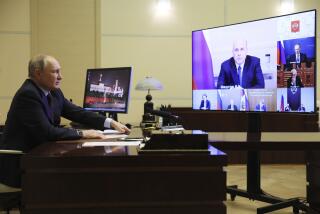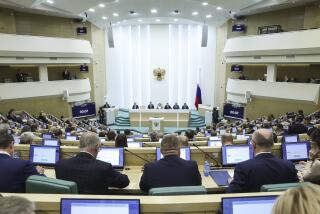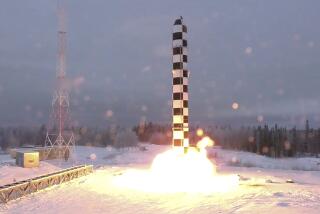President Raps A-Test Resolution : House Move Doesn’t Serve U.S. Interests, Letter to Dole Says
- Share via
WASHINGTON — President Reagan today denounced a House-passed resolution calling on him to negotiate a total ban on nuclear tests, saying it does not “serve the interests of the United States, our allies and our friends” and would undercut his efforts to make progress on the issue.
Reagan made the statements in a letter to Senate Majority Leader Bob Dole (R-Kan.). The text of the letter was released by the White House.
On Feb. 26, the House voted 268 to 148 in favor of the non-binding resolution asking the Reagan Administration to negotiate a total ban on nuclear tests.
The Senate approved the same resolution in June, 1984, by a margin of 77 to 22. Senate Republicans have said they would not take up the issue again, unless the White House asked them to.
Interests Not Served
“The actions called for by (the resolution) do not serve the interests of the United States, our allies and our friends,” Reagan wrote in the letter.
“They would undercut the initiatives I have proposed to make progress on nuclear test limitations issues, and they would set back prospects on a broad range of arms control efforts, including the achievement of deep, stabilizing and verifiable arms reductions.”
Besides calling on the Administration and the Soviets to resume negotiations aimed at a complete ban on nuclear tests, the resolution also asks Reagan to request the Senate to ratify two other arms control treaties.
The two pacts are the 1974 Threshold Test Ban Treaty, which bans underground tests of yields greater than 150 kilotons, and the 1976 Peaceful Nuclear Explosions Treaty, which bans explosions greater than 150 kilotons.
Neither one has been ratified by the United States, but both the United States and the Soviets have said they would observe them.
Negotiations Suspended
In 1963, the Limited Test Ban Treaty banned open air testing. Since that time, both sides have said they would attempt to reach a total ban on testing. Negotiations were suspended in 1979 by President Jimmy Carter in reaction to the Soviet invasion of Afghanistan and have never been formally reopened.
Reagan said that a comprehensive test ban remains a long-term goal of the United States but that one is not possible as long as there is no agreement on “broad, deep and verifiable arms reductions,” on enhanced verification measures and a greater balance in conventional forces.
The President added that “a pattern of Soviet non-compliance with its arms control obligations” and agreements on limiting nuclear testing heightens his concern.
More to Read
Sign up for Essential California
The most important California stories and recommendations in your inbox every morning.
You may occasionally receive promotional content from the Los Angeles Times.













